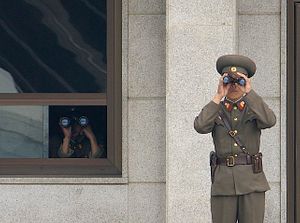Amid harsh criticism, the South Korean government has decided to push for a controversial move to thoroughly crack down on activists sending anti-Pyongyang leaflets across the border to North Korea.
South Korea’s Unification Ministry filed a police complaint against two defector groups on June 11 over leaflet launches, while the ruling Democratic Party of Korea vowed to introduce a tougher law to crack down on and punish those who send leaflets to the North.
Seoul’s move is widely seen as a response to Pyongyang’s latest threat to scrap a military agreement with South Korea and close down a cross-border liaison office. Kim Yo Jong, the sister of the North Korean leader, specifically cited anti-Pyongyang leaflets as an issue.
When the South Korean government first said it would take actions against these activists, it drew criticism from North Korean defectors and human rights advocates, who were concerned the move could restrict the freedom of expression, but there were some sympathetic voices as well.
The two Koreas agreed in 2018 to take steps to reduce conventional military threats, such as establishing buffer and no-fly zones. Seoul sees the balloons carrying leaflets from the South to the North a flying object that violates this agreement, so many believe a move to stop such leaflets is inevitable to honor the agreement with the North.
However, the mood has changed now that the government is taking concrete action. Since the Unification Ministry’s announcement, critical voices have been growing rapidly, and they are very harsh.
Four lawmakers from the country’s main opposition United Future Party released a statement to denounce Seoul’s move. One of them is Ji Sung-ho, a North Korean defector-turned-South Korean legislator
Criticizing the South Korean government for “caving in” North Korea’s threat, the lawmakers demanded that the government stop devaluing South Korea’s constitution, which guarantees the freedom of speech.
The country’s largest daily by circulation volume, Chosun Ilbo, also raised a critical voice, saying that the government is attempting to punish and send its people to prison to protect the interests of the “world’s worst dictators,” referring to North Korean leader Kim Jong Un and his sister.
In the latest poll conducted by Realmeter, 50 percent of respondents said they opposed the government’s move to introduce a new law to stop and punish such activists. A total of 500 people over 18 years old were canvassed for the poll on June 10.
Criticisms are not only coming from inside South Korea. Sue Mi Terry, a senior fellow at the Center for Strategic and International Studies, said on her Twitter account that the South Korean President Moon Jae-in should know by now that it is “impossible to placate” North Korea.
Calling Pyongyang the “ultimate bully,” Terry added, “Bullies prey on those whom they perceive as weaker. Seoul needs to show some backbone.”
Joshua Stanton, a lawyer who participated in drafting a bill on U.S. sanctions on the North, also tweeted his criticism. “A law designed by a self-described human rights lawyer to shield the perpetrators of crimes against humanity behind a curtain of fear is unjust,” referring to Moon and the law pushed by the South Korean government.
Human Rights Watch and the National Endowment for Democracy in the United States also raised their concerns.
The two Koreas held the first inter-Korean summit in 2000, which will mark its 20th anniversary soon. At that time, the Kim Dae-jung administration of South Korea took both strong and flexible approaches when dealing with the North. It pushed for the Sunshine Policy while not hesitating to respond to North Korea’s military provocation and threats strongly.
It is evident, however, that Moon and his administration are overly fearful of disrupting inter-Korean relations. Yet Moon has little to show for his caution; the North recently announced that it had cut off all inter-Korean communication mechanisms. Moon’s government should remember that if it takes a step that undermines the principle of free nations, it will eventually jeopardize the stability on the Korean Peninsula.

































